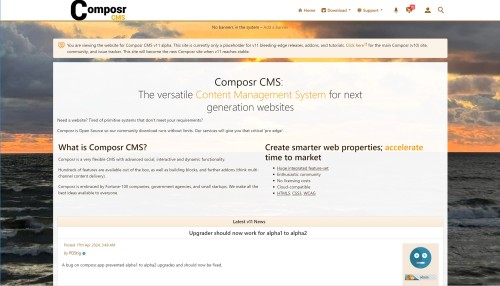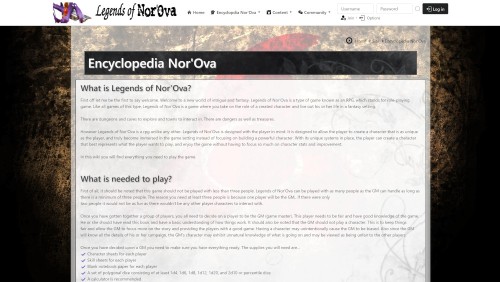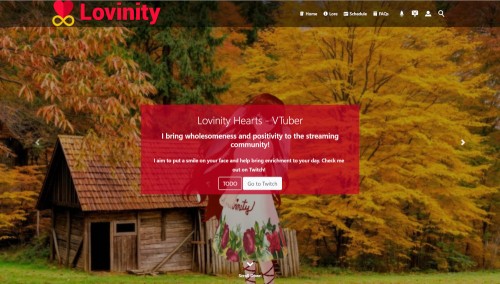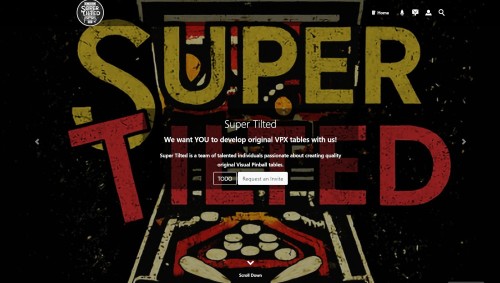Featured Sites: A-Z Index
H
Newest 10 Entries
| Title | Featured Content |
|---|---|
| Icon | 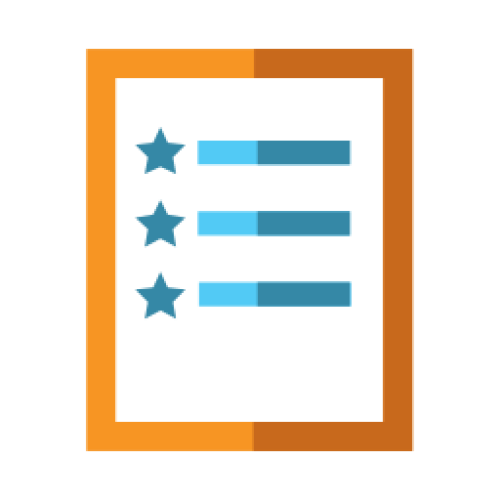 |
| Description | Random quotes: Put random quotes (e.g. testimonials) into your design. Awards: Showcase your most popular content, and optionally award the submitter with points. Tags: Set keyword tags for content and display tag clouds. Recent content: Automatically feature links to your most recent content (via main_multi_content block). Show website statistics to your visitors (via stats graphs or page hit counters). Random content: Feature random content from your website specified via a sophisticated filtering language. |
| Title | Newsletters |
|---|---|
| Icon |  |
| Description | Automatically create newsletter issues highlighting your latest content Double opt-in: Prevent false sign-ups by asking subscribers to confirm their subscriptions. Host multiple newsletters: Visitors can subscribe to the ones they want. Flexible mailings: Send out mailings to all members, to different usergroups, or to subscribers of specific newsletters. Welcome e-mails: Send multiple welcome e-mails to new users automatically, on a configurable schedule (Conversr-only). Bounce cleanup: Automatically clean out bounces from your e-mail list. Unsubscribe: Recipients can easily unsubscribe from newsletters through an unsubscribe link provided in the e-mail. Change settings: Newsletter subscribers can change their subscription settings on-site. Drip sending: Prevent overwhelming your mail server or outbound limits. |
| Title | Searching |
|---|---|
| Icon |  |
| Description | Choose what is searchable Boolean and full-text modes Keyword highlighting in results Search boxes to integrate into your website Logging/stats OpenSearch support: Allow users to search from inside their web browser. Results sorting, and filtering by author and date Search within downloads: Including support for looking inside archives. Composr fast custom index: Support full-text searches in instances where your database does not |
| Title | Banners |
|---|---|
| Icon |  |
| Description | Multiple types: Each one can specify its own width-by-height (e.g. skyscraper). Smart banners: Integrate text-banners into your content via keyword detection. Broad media compatibility: Image banners, external banner rotations, and text banners. Determine which banners display most often Run a cross-site banner network Hit-balancing support: A site on a banner network gets as many inbound hits as it provides outbound clicks. Targeted advertising: Show different banners to different usergroups. Track banner performance Use the banner system to display whole sets of sponsor logos or partners Supports Geotargeting Periodic content reviews: Reminders to check (or remove) banners |
| Title | Installation |
|---|---|
| Icon |  |
| Description | Quick installer: Our self-extractor allows faster uploads and will automatically set permissions. Wizard-based installation Auto-scans for compatibility problems: Be informed of problems before installing Get your site up and running in just a few minutes Keep your site closed to regular visitors until you're happy to open it Configures server: Automatically generates an htaccess file for you (for Apache). Auto-detection of forum settings for easy integration Install test content |
| Title | Web Pages |
|---|---|
| Icon | 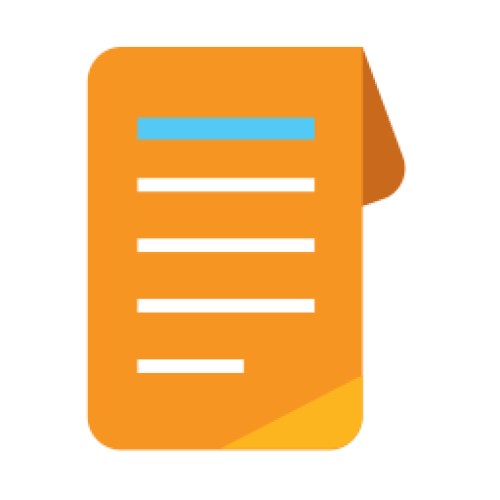 |
| Description | Add virtually unlimited pages to your site WYSIWYG editor (powered by CKEditor) Convenient edit links: Staff see “edit this” links at the bottom of every page. PHP support: Upload your PHP scripts and run them inside Composr (may require adjustments to the script code). Hierarchical page structure: Supports parent and child pages Periodic content reviews: Helping you ensure ongoing accuracy of your content. Add Comcode pages (the default) or static HTML pages Supports revisions and revision control systems (such as git); add new pages as files, and Composr will automatically register them in its system. |
| Title | Downloads |
|---|---|
| Icon |  |
| Description | Clear organisation: Uses a tree structure for unlimited categorisation. Anti-leech protection: download links contain a session ID Community-centred: Allow users to comment upon and rate downloads Many ways to add new files: Upload files. Link-to existing files. Copy existing files using a live URL. Batch import links from existing file stores. Author support: Assign your downloads to authors, so users can find other downloads by the same author. Set licences: Make users agree to a licence before downloading. Images: Show images along with your downloads (e.g. screen-shots) (this implicitly uses galleries). Basic file versioning support Control monthly bandwidth use site-wide |
| Title | Wiki+ |
|---|---|
| Icon |  |
| Description | Think “structured wikis”. Create an encyclopaedic database for your website Use a tree-structure or traditional cross-linking Supports revisions: Track changes Display the tree structure of your entire Wiki+ Allow users to jump in at random pages Make your pages either wiki-style or topic-style Allow members to contribute to Wiki+ pages by adding Wiki+ posts |
| Title | Quizzes and Surveys |
|---|---|
| Icon |  |
| Description | Run a competition: Choose winners randomly from those who passed the quiz. Surveys: Gather data and find trends. Tests: Test members' knowledge on a variety of topics. Cheat prevention: Settings to prevent cheating, such as time limits, question / answer shuffling, and re-testing rules. Integration with points: Charge points to enter a competition, or award points for winning. |
| Title | News and Blogs |
|---|---|
| Icon |  |
| Description | Member blogs: Allow members to have their own blogs on their profile RSS and Atom support: Export and import feeds. Trackback support: Send and receive trackbacks. Scheduled publishing Ping support and RSS Cloud support Multiple news categories and filtering Multiple ways to integrate news into your website Import from RSS feeds Supports geotargeting Members can rate and comment on news articles and blog posts Send out a news article as a newsletter |
Top 10 Entries
| Question | What defines a staff member in Composr? |
|---|---|
| Answer | There are two ways to define "staff" in Composr:
Composr prioritizes flexibility by utilizing privileges over fixed roles, allowing for customized staff responsibilities. However, certain features like "staff reply" in tickets inherently rely on a pre-existing understanding of "staff." |
| Question | What steps should I take if my website has been hacked? |
|---|---|
| Answer | If you suspect a security breach, take immediate action:
|
| Question | What additional security measures can I implement for my Composr website? |
|---|---|
| Answer |
|
| Question | How does Content Security Policy (CSP) contribute to Composr security? |
|---|---|
| Answer | CSP adds a layer of protection by controlling the resources the browser is allowed to load. It helps prevent:
Composr's CSP implementation utilizes "Trusted partner sites" and nonces for fine-grained control. |
| Question | What is the purpose of "confirmed" and "non-confirmed" sessions? |
|---|---|
| Answer | Composr distinguishes between confirmed and non-confirmed sessions for added security:
You can configure zones to require confirmed sessions, preventing access from cookie-based logins alone. The Admin Zone uses this by default. |
| Question | How can I enhance the security of my Composr installation on shared hosting? |
|---|---|
| Answer | Shared hosting environments can be inherently less secure. Here are some tips:
|
| Question | How does Composr protect against Cross-Site Scripting (XSS) attacks? |
|---|---|
| Answer | Composr utilizes multiple layers of defense against XSS attacks:
|
| Question | What are the different types of security alerts in Composr? |
|---|---|
| Answer | Composr has a variety of hack-attack codenames that trigger security alerts and logging. Some common examples include:
You can customize alert handling for each type in data_custom/xml_config/advanced_banning.xml (Admin Zone > Security > Configure advanced banning). |
| Question | What are some tips for secure website maintenance? |
|---|---|
| Answer |
|
| Question | What are the main security features of Composr? |
|---|---|
| Answer | Composr has a robust set of security features to protect your website, including: Passwords:
Login Restrictions:
Auditing Systems:
Framework Security:
Other features:
|



